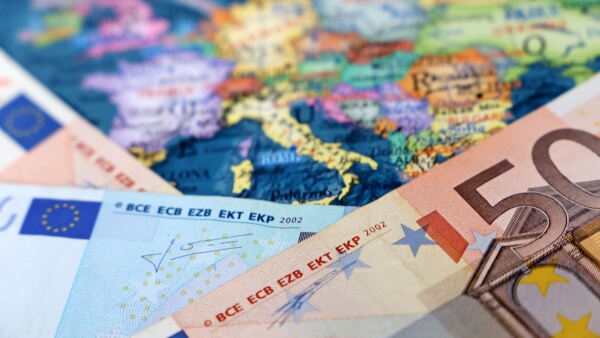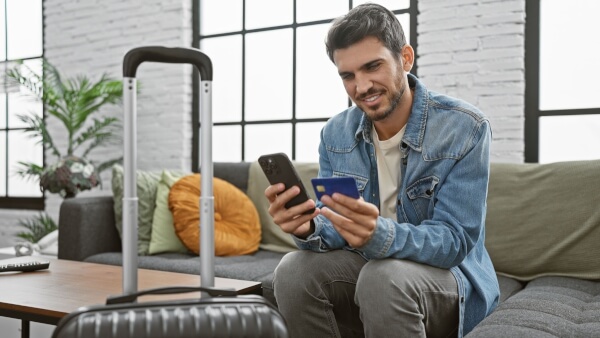Morrisons travel money exchange rate: What you need to know
Looking for a way to manage your spending while travelling? Read our guide on the Morrisons Travel Money exchange rate and other key features.

The Post Office is a familiar feature on many UK high streets - and as well as offering postal services, you can also pick up your travel money while you’re there.
You might decide to exchange money for your holiday by ordering in advance and collecting it at the Post Office at your convenience, or for home delivery¹. You can use the ‘same day collections’ service to have your money in just a couple of hours from a local branch if you’re buying US dollars or euros². Alternatively you can get a travel money card which can be a convenient and safe way to carry your holiday money without having too much cash in your pocket.
If you’re considering getting your foreign currency from the Post Office, it’s important to understand the exchange rates which are used, and any fees you might need to pay. It’s also a good idea to compare travel money exchange rates from different providers before you commit, as they can all have different fees, and use different exchange rates. One alternative could be Wise, which always exchanges your money with the real, mid-market exchange rate. You can either make a payment to someone else’s bank account, or open your own multi-currency borderless account, and spend money with the debit card that is attached to it.
But first, here’s all you need to know about Post Office Travel Money.
The Post Office offer various different ways to get your travel money - here’s an outline of your options:
You can order your foreign currency online and collect it in your local branch, or have it delivered to your home. You can order from £400 to £2,500, and have it ready for collection or delivery the next day³. If the currency you want is already available at a local branch, you can collect it earlier. You can also walk into some Post Office branches to ask for a foreign exchange service on the spot. However, the Post Office exchange rate used for walk in exchange services will not be as good as online - and as branches don’t stock large sums of travel money, ordering online is advised.
Click and Collect Express is offered for euro and US dollar exchange, and means you can order these currencies for collection at your local Post Office, and pick them up just 2 hours later⁴.
You can get a Post Office multi currency travel money card, which you load money onto before travelling, and then use to make ATM withdrawals and get local currency wherever you are. You can also use it to pay for goods and services directly, like you might a debit card⁵. There are various fees and charges you need to know about, if you choose a travel money card, including cash withdrawal fees and a monthly fee for inactivity. More on that later.
Here’s an outline of the main fees you need to know about, if you’re considering getting your travel money from the Post Office.
| Service | Post Office Travel Money fee |
|---|---|
| Exchange fees for travel money - branch collection or delivery | The Post Office Travel Money service does not charge an explicit commission or exchange fee - however you may find that there's a markup added to the real exchange rate. More on that later. |
| Home delivery of travel money³ | £4.99 for orders worth under £500, free above that amount. There’s an additional charge of £1.50 for orders delivered on a Saturday. |
| Credit card payment fees² | Your credit card provider may charge interest or additional fees if you use a credit card to purchase travel money. That’s because the transaction might be treated as a cash advance. |
| Corporate credit card payment² fees | If you’re using a corporate credit to fund the payment, there could be an additional charge of 2% of the value of the transaction. |
| Cancelling an order² | Up to £20 |
| Travel Money Card - loading fee for pounds sterling⁵ | 1.5% of the value of the load amount, from £3 to a maximum of £50 |
| Travel Money Card - monthly maintenance fee⁵ | £2 a month if not used for 12 months |
| Travel Money Card - ATM withdrawal fee⁵ | The fee charged for ATM withdrawals depends on the currency in question. US dollar withdrawals are charged $2.50, while euro withdrawals cost €2 each, for example. |
| Travel Money Card - other fees⁵ | There may be a 3% cross border fee if you use your card to pay for something using a currency which is not loaded onto it |
| Travel Money Card - account closure fee⁵ | £5 |
If you’re considering using the Post Office Travel Money service for either foreign currency exchange, or to get a travel money card, there are a few things you need to know about the exchange rate you’ll get. Firstly, there are different exchange rates offered online, compared to in Post Office branches. Here’s how the service explains this¹:
“Branch exchange rates depend on several factors, eg., branch location, competition, cost of order, convenience, etc. We will always try and offer the best rate, subject to this criteria. As with many retailers, the cheapest order / distribution method is online, where centralised packing costs can be used. This is why online exchanges are invariably better than branch rates.”
If you choose to buy your foreign currency in a Post Office branch, the exchange rate will vary depending on your location. Here’s how the Post Office Travel Money FAQ explains this¹:
“Do all your branches have the same rate? No. Branch exchange rates depend on several factors like branch location, competition, cost of order, convenience, etc.”
This means that the very best way to get your foreign currency from the Post Office Travel Money service, is to order the currency you need online for either collection or home delivery. However, because exchange rates go up and down all the time, the service reserves the right to cancel your order if there's a dramatic change in the exchange rate in your currency pairing².
You can sell your unused travel money back to the Post Office if you want to - but this service will use a different exchange rate to the one applied when you bought the foreign currency in the first place¹. Thus, it’s important to try and make sure you exchange the correct amount of money, otherwise you may find that you lose out because of this.
Once you have worked out what exchange rate will be used by Post Office Travel Money for your foreign exchange, you should compare it to the mid-market exchange rate.
This is the only, real exchange rate, and you can get it easily by googling your currency pairing, checking an independant site like Reuters or XE, or using an online currency converter. It’s important to do this, because many banks and foreign exchange services take the real exchange rate, and then add a markup or spread - which is essentially an extra fee - to increase their profit. This can mean you might pay more than you have to for your foreign currency exchange, even when the bank or foreign exchange service offers zero commission currency exchange.
If you’re not happy with the exchange rate that Post Office Travel Money offer for your currency pairing, it might be time to find an alternative way to get your holiday cash. For example, you could consider using a multi-currency borderless account from Wise to get foreign currency exchange using the real exchange rate, and low fair fees for transactions. We’ll talk more about that - and other ways to dodge unfair fees for currency exchange - in a moment.
The Post Office Travel Money service advises customers to order their holiday money online, and then either collect it in a local branch of the Post Office, or have it delivered to their home. The best exchange rates are only available online, although you may pay a fee for home delivery, depending on the amount you choose to exchange.
However, there are alternatives to this. If you’re travelling to visit family or friends, and they have a bank account wherever you’re headed, you might choose to use Wise to make a low cost international payment to their local account. Your transfer will be made using the real exchange rate, and for just a small upfront fee. You can then use fee free cash machines to make withdrawals in the local currency once you arrive.
You can get a Post Office Travel Money Card if you’re over 18 years old, and use it to spend and make cash withdrawals in up to 13 currencies⁵.
To get a Post Office Travel Money Card, you’ll need to provide your UK passport or driving license to prove your identity. You can either order your card online, for home delivery within 4 to 6 days, or go to a Post Office branch with your documents to get one immediately. Once you have activated your card, you can top up in the currency you need, and then use the card to either make ATM withdrawals, or to pay directly for things in bars and shops while you travel. The card is accepted anywhere the MasterCard logo is displayed⁵.
There are a range of fees related to the Post Office Travel Money Card, including fees to make ATM withdrawals, costs for inactivity and costs to close your account. Costs vary depending on the currency you’re using, but it’s worth understanding these charges before you commit to the card⁵.
If you choose to use a travel money card - or any credit or debit card - while you’re away, it’s also good to know that you may be charged extra if you use an ATM and get caught out by dynamic currency conversion (DCC)
This is where you’re asked if you’d like to spend in your home currency, or in the local currency wherever you are. Banks and merchants say DCC is a service which saves customers the hassle of doing the currency exchange calculations themselves - but actually, DCC can mean you pay more than you have to. If you’re asked, it's always a better idea to pay in the local currency, as you’ll likely get the best exchange rate this way.
When you’re deciding how to arrange your travel money, another option to consider is a borderless account from Wise. This multi-currency account lets you hold your money in any of dozens of different currencies, check your balance across them all, and switch between them using the real mid-market exchange rate whenever you want to.
You can get a linked travel money card which allows you to spend in shops and restaurants while you travel, and you can withdraw up to the currency equivalent of £200 a month from ATMs, fee free. Above that amount there's a small charge to make ATM withdrawals.
There’s no cost to get a borderless account or linked debit card, and no minimum balance or minimum usage requirement. That means you can use your account as much or as little as you like while you travel, for no extra cost. See if you can save time and money with a Wise borderless account, today.
If you’re planning a holiday, you’ll need to have some local currency to pay for things while you’re travelling. There are several different ways you can get local cash for wherever you’re headed - so it's well worth while doing a bit of research to find the option that is best suited to your needs, including checking out high street options like the Post Office, and online alternatives like Wise. That way you’ll end up with more money in your pocket to enjoy while you’re away!
Sources:
1.https://www.postoffice.co.uk/foreign-currency-faqs
2.https://postoffice.travelmoneyonline.co.uk/foreign-currency-converter/terms-and-condition
3.https://www.postoffice.co.uk/foreign-currency
4.https://www.postoffice.co.uk/travel-money
5.https://www.postoffice.co.uk/travel-money/card
*All sources checked on November 19, 2018
This publication is provided for general information purposes only and is not intended to cover every aspect of the topics with which it deals. It is not intended to amount to advice on which you should rely. You must obtain professional or specialist advice before taking, or refraining from, any action on the basis of the content in this publication. The information in this publication does not constitute legal, tax or other professional advice from TransferWise Limited or its affiliates. Prior results do not guarantee a similar outcome. We make no representations, warranties or guarantees, whether express or implied, that the content in the publication is accurate, complete or up to date.
*Please see terms of use and product availability for your region or visit Wise fees and pricing for the most up to date pricing and fee information.
This publication is provided for general information purposes and does not constitute legal, tax or other professional advice from Wise Payments Limited or its subsidiaries and its affiliates, and it is not intended as a substitute for obtaining advice from a financial advisor or any other professional.
We make no representations, warranties or guarantees, whether expressed or implied, that the content in the publication is accurate, complete or up to date.

Looking for a way to manage your spending while travelling? Read our guide on the Morrisons Travel Money exchange rate and other key features.

Should you pay with cash or card in Barbados? A handy guide including cash etiquette, Barbadian ATMs and using your UK card.

Should you pay with cash or card in Albania? A handy guide including cash etiquette, Albanian ATMs and using your UK card.

Discover how to use your Metro Bank debit card overseas. Our guide covers foreign transaction fees, exchange rates, and tips for holiday spending.

Getting ready for a trip? Read our guide on the Barclays travel credit card and plan your holiday spending.

Getting ready for a trip? Read our guide on the HSBC travel credit card and plan your holiday spending.